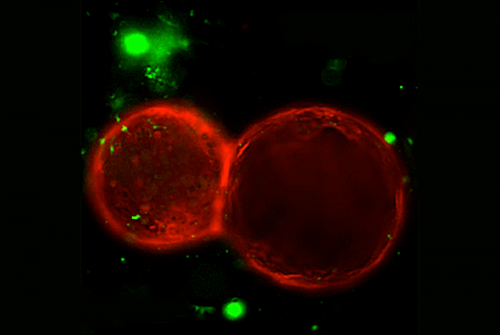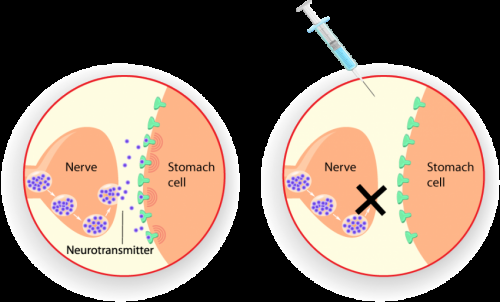Severing nerves may shrink stomach cancers: Botox injections slow growth of tumors

(Medical Xpress)—Research from Columbia University Medical Center shows that nerves may play a critical role in stomach cancer growth and that blocking nerve signals using surgery or Botox (onabotulinumtoxinA) could be an effective treatment for the disease. The study was conducted by the laboratory of Timothy C. Wang, MD, in collaboration with Duan Chen, MD, PhD, in Norway and is published in this month's issue of Science Translational Medicine.
"Scientists have long observed that human and mouse cancers contain a lot of nerves in and around the tumor cells," said Dr. Wang, the Dorothy L. and Daniel H. Silberberg Professor of Medicine at Columbia's Herbert Irving Comprehensive Cancer Center. "We wanted to understand more about the role of nerves in the initiation and growth of cancer, by focusing on stomach cancer."
Stomach cancer is the fourth-leading type of cancer and the second-highest contributor to cancer mortality worldwide, with a 5-year survival rate of less than 25 percent.
Using three different mouse models of stomach cancer, Dr. Wang's team found that when they performed a procedure called a vagotomy to cut the nerves, the surgery significantly slowed tumor growth and increased survival rates. Removing nerve connections from only one side of the stomach allowed cancer to continue growing on the other side (with the intact nerves), providing further evidence of the importance of nerves in tumor growth.
Dr. Wang's team then tried to block transmission of nerve signals pharmacologically. They found that when they injected Botox into mice, the drug proved to be as effective as surgery at reducing stomach cancer growth. "We found that blocking the nerve signals makes the cancer cells more vulnerable—it removes one of the key factors that regulate their growth," said Dr. Wang.

Botox prevents nerve cells from releasing a neurotransmitter called acetylcholine. In the case of cosmetic treatment, for example, blocking acetylcholine helps to lessen facial wrinkles by causing temporary paralysis of the muscles. Because acetylcholine also ordinarily stimulates cell division, using Botox to prevent acetylcholine release might help slow the growth of cancer.
Dr. Wang's team also found evidence of the effectiveness of targeting nerves for cancer treatment in human patients when they compared 37 patients who had a recurrence of stomach cancer many years after surgery. Of the 13 patients who had had a vagotomy as part of their procedure, in all but one case, tumors did not develop in regions where the nerve connections had been severed. By contrast, tumors were found in the same region of the stomach in all 24 patients who had not had a vagotomy.
Next, Dr. Wang's team plans to investigate the effectiveness of nerve-targeted therapy used in combination with other cancer treatments. Initial experiments have shown that blocking nerves makes cancer cells more vulnerable to chemical agents. Botox used in combination with chemotherapy in mice increases survival rates up to 35 percent, compared with chemotherapy alone.

A limitation of the current studies is that they focus primarily on early stages of stomach cancer. "In the future, we'd really like to look at how we can use this method of targeting nerves to stop the growth of more advanced tumors," Dr. Wang said. His laboratory hopes to develop drugs that block neurotransmitter receptors. This approach would be more effective than surgery or Botox on more invasive forms on cancer, as such drugs would be able reach cells that have broken away from the main tumor.
More information: The paper is titled, "Denervation Suppresses Gastric Tumorigenesis." It is available at stm.sciencemag.org/lookup/doi/ … scitranslmed.3009569
The other contributors are Chun-Mei Zhao (Norwegian University of Science and Technology), Yoku Hayakawa (CUMC), Yosuke Kodama (NUST), Sureshkumar Muthupalani (MIT), Christoph B. Westphalen (CUMC), Gøran T. Andersen (NUST), Arnar Flatberg (NUST), Helene Johannessen (NUST), Richard A. Friedman (CUMC), Bernhard W. Renz (CUMC), Arne K. Sandvik (NUST), Vidar Beisvag (NUST), Hiroyuki Tomita (Gifu University, Japan), Akira Hara (Gifu University), Michael Quante (Technische Universität München, Germany), Zhishan Li (CUMC), Michael D. Gershon, (CUMC), Kazuhiro Kaneko (National Cancer Center Hospital East, Japan), James G. Fox (MIT), and Duan Chen (NUST).













